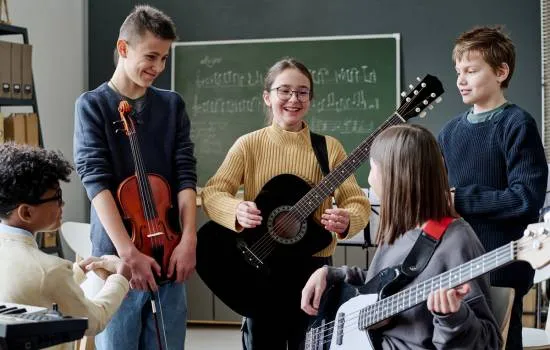Cómo aprovechar los recursos digitales para aprender música
Advertisements
Turn your cell phone into your personal music teacher
Your best instrument is your perseverance
It's not the app, the instrument, or even the timing: what really makes the difference is how consistently you practice.
Your cell phone can be a powerful educational tool… if you know how to use it with discipline.
How to put together your digital music routine
For digital resources to really work, you need a daily or weekly structure that fits your reality. It doesn't matter if you have 15 minutes or an hour a day: the important thing is that this time is defined and repeated regularly.
Advertisements
Start by marking the days and times of your practice. Then, define what you'll do in each session: Will you work on technique? Learn a new song? Take a theory class? This way, you won't waste time choosing on the fly.
It's also helpful to have a comfortable space, even a small one, where you can focus. Having your instrument handy and your apps installed and organized makes starting each session easier.
Finally, track your progress. Many apps already do this, but you can also write down what you accomplished and how difficult it was. This little log reinforces your commitment and helps you adjust your plan if something isn't working.
Advertisements
Common mistakes that make you quit quickly
One of the most common mistakes is jumping between apps without clear directionStarting with Yousician, moving on to a single YouTube video, and then watching theory on another platform may seem productive, but without a common thread, it only creates confusion and fatigue.
Another problem is the lack of goalsPracticing without knowing why or why leads to stagnation. Set simple, realistic goals: play a complete song, learn three new chords, improve your rhythm.
The information overload It's also a trap. The digital world offers so much content that it's easy to get overwhelmed. Don't try to cover everything. Choose a base app, supplement it with a secondary source, and stick with it for a while.
And of course there is the excessive self-criticismIf today didn't go well, it doesn't mean you're failing. Music, like any learning process, has ups and downs. The important thing is to keep going.
Keys to staying motivated with digital resources
Motivation is not constant, but you can build it strategies to sustain itOne of the most effective ways is to incorporate variety into your routine. Alternate theory classes with free practice, change your repertoire, and try different musical styles.
It also helps to have achievable goals: Play 10 minutes without mistakes, learn a new song a week, master a difficult rhythm. Achieving these micro-goals creates a sense of progress.
Another key is share your progressYou can record yourself, show your progress to a friend, or participate in online music communities. Feeling part of something bigger increases your commitment and connects you with others.
And, very important: Use apps as allies, not as judgesIf a tool pushes you more than it motivates you, change it. There are many resources available. Find the ones that fit your style and pace.
Learning music should be a pleasurable process, not a source of stress. Enjoy the journey. Celebrate every note that sounds better than it did yesterday.

Digital music also transforms your real world
The true power of digital resources isn't in the technology itself, but in what you do with it. Learning music from an app, a platform, or a video call may seem "virtual," but its effects are profoundly real.
The discipline you develop through practice, the confidence you build as you improve, the excitement of playing a song for the first time—all of these impact your daily life. They connect you with your creativity, reduce stress, improve your focus, and boost your self-esteem.
Plus, by learning music online, you become your own teacher. You learn to manage your time, evaluate your progress, and resolve issues on your own. This makes you more independent, not only as a musician but as a person.
You don't need a soundproof room or a teacher by your side. You just need a clear purpose, a useful tool, and the desire to express yourself. The rest comes step by step.
So harness the power in the palm of your hand. Open your app, choose your song, breathe… and let the music flow. Because every click, every note, and every minute dedicated to your digital learning is a real step toward a more fulfilling version of yourself.

You may also be interested in